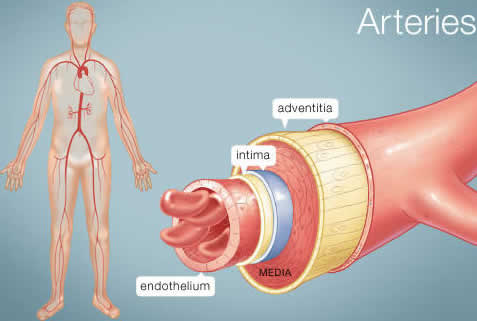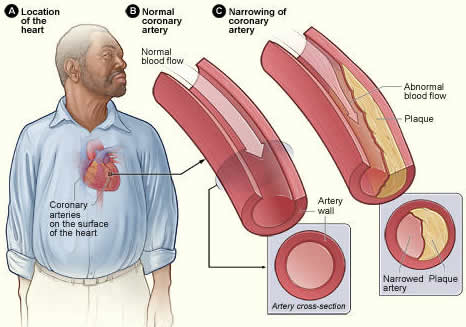Does High Cholesterol Mean You Have Clogged Arteries?
It’s clear that having high cholesterol can be harmful for your cardiovascular system because it can increase your risk of having clogged arteries (such as arthrosclerosis – a term used to describe hardening of the arteries). Arteries are the most common of your blood vessels where the plague buildups due to excessive cholesterol in the blood occur. Excessive amounts of cholesterol that travel through the blood can affect the blood flow inside the arteries which then eventually can make your heart work harder in pumping the blood. And if your blood flow cannot run as well as it should, there will be many serious complications that occur such as hypertension (high blood pressure), heart disease, heart attack, and stroke.
In general, cholesterol is classified by the type of particles that carry cholesterol in the blood called lipoprotein. So, lipoprotein itself is a package of protein-cholesterol. LDL and HDL are the most common kinds of cholesterol discussed when it comes to the issue of lowering the risk of heart disease.
While LDL stands for low density lipoprotein, HLD stands for high density lipoprotein. And as the name suggests, LDL is high in fatty deposits and cholesterol. On the other side, HDL is very low in cholesterol.
Overall, we can say that HDL is good cholesterol and LDL is bad cholesterol. How they work in affecting the blood flow inside arteries opposing each other. While high LDL increases the risk of creating more plague buildups on the artery’s walls, HDL works in the opposite way (it can help lower LDL in the blood, for more detailed information about how HDL works in lowering your LDL visit this section)!
Diet high in soluble fiber and low in saturated fat can be helpful to boost your HDL and lower your LDL. See also best foods you need to eat to improve your cholesterol in here!
However, your diet is not the single reason of your increased LDL. Doing Regular exercise and practicing other healthy habits are also important to keep your LDL off and improve your entire health.
Arteries are one of your major blood vessels. They have crucial function to distribute the blood from the heart to the tissues /cells of the body. In other words, these blood vessels carry your blood rich in oxygen and essential nutrients to the cells of your body.
Imagine if this crucial mechanism doesn’t work as well as it should, there will be lots of complications that can be harm your entire health. Therefore, it’s very important to maintain your blood pressure and cholesterols (two variables that often affect the blood flow inside the arteries).
All of your arteries are a muscular tube lined by many smooth tissues. Generally, artery has 3 major layers; intima, media, and adventitia. The inner layer of intima lined by another smooth tissue medically called endothelium. The image below (credit to WebMD) can explain clearly the position of each major layer of artery.
Clogged arteries can be caused by different factors. Arthrosclerosis (hardening of arteries) is not the single condition that can cause a clogged artery.
Temporal arteritis (a condition when there is inflammation in the scalp’s temporal artery), cerebrovascular accident (a kind of clogged artery that often cause stroke), arterial thrombosis (a sudden blot clot that occurs in one of arteries), and vasculitis (a medical term used to call inflammation that develop in a artery or more arteries at the same time) are other conditions that can lead to one or more clogged arteries.
In normal and healthy condition, your arteries should be elastic and flexible. But over time or as you age, they can be stiff and stick – this process is medically called as arteriosclerosis (hardening of arteries).
And this can go faster than it should if you stick with unhealthy diet (especially diet high in saturated fat & cholesterol along with diet low in fiber) and followed with other unhealthy habits such as poor in exercise (lack of physical activity), smoking, lack of sleep, and so on.
Even uncontrollable stress can make the problem get worse since stress can increase your blood pressure – and as well we know that high blood pressure can raise LDL. See also why your cholesterol tends to increase as you age!
How about with atherosclerosis?
Atherosclerosis is a specific condition of arteriosclerosis that often used to call plague buildups from fatty deposits and cholesterol that form and attach on the walls of arteries which then eventually can inhibit the flow of the blood in the artery.
Over time, atherosclerosis can be potential to cause a clogged artery if left untreated.
All kinds of cholesterol (even for bad cholesterols such as LDL and triglyceride) are needed and required by your body to support some body’s functions. And there should be nothing to worry as long as they are in normal levels.
Unfortunately, your body can make its own cholesterol. In other words, generally your body doesn’t need cholesterol from outside. For this reason, it’s important to restrict foods high in cholesterol and saturated fats!
If you have high cholesterol, this means that there are lots of cholesterol and fatty deposits that travel through the blood carried by lipoprotein. And more fatty deposits in the blood can increase your chance of having more plague buildups on the walls of your arteries (atherosclerosis).
From the image above you see that the narrowed artery occur in artery with atherosclerosis. In this case, the blood cannot flow optimally because the narrowed diameter of the artery. And if you continuously stick with your unhealthy habits that can increase your LDL, there is chance for that narrowed artery to be clogged.
Unfortunately, there is no clearly answer of this question because many times clogged artery due to atherosclerosis is unpredictable – so we are only able to talk about ‘your chance’.
In general, sometime atherosclerosis can cause noticeable symptom (such as pain in chest and leg) in the middle and older age. It is progressive condition, but fortunately it is also treatable and preventable.
 Furthermore, the chance of atherosclerosis from cholesterol to clog artery is affected by the following factors:
Furthermore, the chance of atherosclerosis from cholesterol to clog artery is affected by the following factors:
- Your physical activity level. More physical activity you do daily, lower chance of the plague to clog the artery. Therefore, it’s so important to have regular exercise!
- Your diet. If you love eating more foods high in cholesterol & saturated fat and eating fewer foods high in fiber, this can speed the accumulation of fatty deposits on the artery’s wall to cause a clogged artery.
- Overweight and obese – if you are not on your best and healthy scale, this can increase you chance of getting a clogged artery.
- Your age. Having a plague buildup of atherosclerosis when you are over 40 are more likely to cause a clogged artery if compared when you are younger than 30. As you age, the elasticity and flexibility of your blood vessels decreases, either for your metabolic rate (a crucial variable to help control and maintain your healthy weight).
- Other bad lifestyles that can speed the plague in the artery’s wall to cause a clogged artery include drinking alcohol too much, cigarette smoking, having uncontrolled stress, and diet high in salt because salt can cause hypertension (high blood pressure) – and hypertension can rise your LDL.
In addition, if you have diabetes, it’s important to control your blood sugar because more episodes of high blood sugar that you experience can damage the lining of arteries. And damaged areas on the walls of your arteries means that fatty deposits & cholesterol can penetrate the artery’s walls more easily.
The way of the plague buildups from atherosclerosis to clog arteries can come and behave in different ways that include:






I was researching how I have been diagnosed as having elevated LDL for 20 years. But in a recent super extensive physical to qualify as an organ donor they evaluated my arteries as absolutely plaque free, my heart as functioning incredibly well, outstanding kidney function and a liver with single digit fat. In fact, other than a discovered genetic clotting factor, I was the perfect donor even at 59 years of age if only I would lose 45 pounds (which I did using a controlled diet monitored by the donor team). I am questioning the need for medication for cholesterol that can potentially impact my other organs in some as yet unnecessary attempt to protect my arteries. Nowhere have I been able to find such information. I believe I may be the exception to the rule and would appreciate any information you can provide that I can discuss with my doctor 1/30/2019. Thank you.
Having a genetic clothing factor, especially at 59 years of age, is not easy to ignore. With lifestyle measures, medications probably are necessary to help control your LDL. In general, your medications should provide benefits that outweigh risks, that’s one of important points to remember. All the best for you!